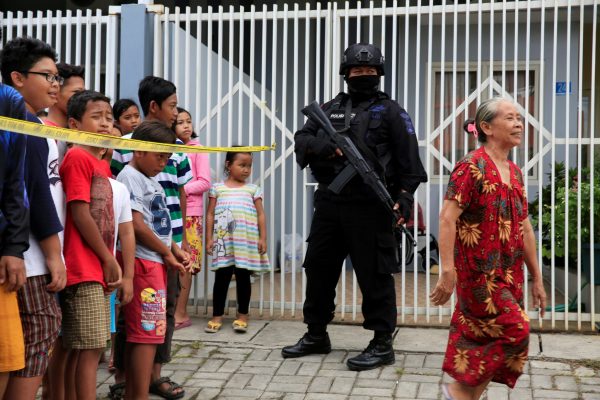What makes these attacks troubling and most likely unprecedented is the fact that the perpetrators involved and killed their own young children. While suicide attacks involving children are not unheard of, the children involved are generally manipulated or forced to commit the attacks by terrorists threatening their families — instead of by the families themselves as happened in Surabaya.
While commanders or leaders of terrorist groups often brag of their willingness to sacrifice their own family in order to show their commitment to the cause, such an outcome rarely eventuates. In the only documented case, the ‘family sacrifice’ was part of an internal power struggle: the attacker was the son of a Taliban leader whose influence over the movement was precarious, and the suicide attack was intended to regain his father’s influence by demonstrating his piety and investment in their cause.
In Indonesia’s case, despite what the severity of the Surabaya attacks would suggest, the Indonesian police have for some time been successfully combating terrorists and preventing major attacks from happening by breaking up and monitoring possible terrorist groups. The last major suicide bombing in Indonesia happened in 2009, when suicide bombers infiltrated the heavily guarded JW Marriott and Ritz Carlton hotels and killed nine people (including themselves). Before that, it was the infamous 2002 Bali Bombings, which killed 202 people and injured 209 more. While terrorists killed four civilians in the 2016 Jakarta attacks, the attacks were conducted so amateurishly that they became a spectacle.
Indeed, the police’s ability to monitor and break up terrorist cells has pushed terrorist groups further underground, which has prevented them from creating a cohesive organisation capable of a major operation scale in similar to the Bali Bombings. The Surabaya attacks were launched by three families who met regularly every Sunday for a prayer meeting. Even so, the attacks were not particularly well coordinated: the most successful of the attacks (against the three churches) were launched by a single family, and those attacks thankfully happened outside the churches where they caused comparatively fewer casualties. The other family tried to attack a police headquarters during a heightened alert situation (and not surprisingly only caused minor damage, though one policeman regrettably died). The parents and one of the children of the third family were killed when the bombs they had manufactured exploded in their own apartment.
So in a sense, the bombings were only semi-coordinated lone-wolf attacks that could have caused much more damage had the perpetrators been better coordinated. To some degree, this stands as evidence of the success of Indonesia’s counterterrorism strategy so far.
This does not mean that there is no major terrorist threat in Indonesia or that there won’t be any attack as devastating as the Surabaya or Bali bombings in the future. Terrorists, seeing the success of the Surabaya bombings, might be tempted to involve children or teenagers in their future attacks. Their capacity to do so has probably increased in recent years due to rising radicalisation of Indonesian society, especially in the aftermath of the religiously tinged 2016 Jakarta gubernatorial election, where children were taught intolerance and were even in one video shown chanting ‘kill Ahok’. Even before the election, a 2015 survey on tolerance among high school students by the Setara Institute showed that one in 14 state high school students in Jakarta and Bandung supported IS — a result further evidenced by research from the Indonesian Ministry of Education and Culture.
Granted, this does not mean that such high schoolers will automatically turn into terrorists and launch suicide attacks. But the results are disturbing enough to indicate that the Indonesian government needs to deal with the growing intolerance in Indonesia, lest they win today’s battle against terrorism but lose the war against radicalism.
Yohanes Sulaiman is a Lecturer in International Relations at the Universitas Jendral Achmad Yani in Cimahi, Indonesia.

